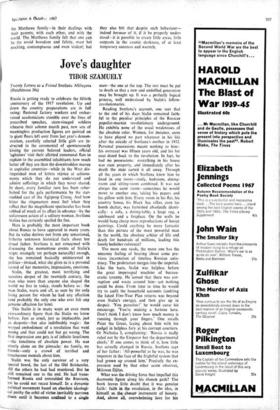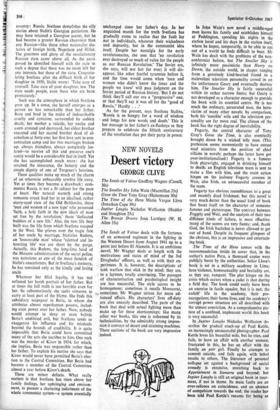Jove's daughter
TIBOR SZAMUELY
Russia is getting ready to celebrate the fiftieth anniversary of the 1917 revolution. Up and down the country preparations are in full swing: flustered factory workers and embar- rassed academicians stumble over the lines of prescribed speeches, stern-visaged soldiers rehearse their solemn march past, new sets of meaningless production figures are painted on to giant floats left over from last year's demon- stration, carefully selected little girls are in- structed in the ceremonial of spontaneously kissing the current beloved leaders, official `agitators' visit their allotted communal flats to explain to the assembled inhabitants how much better off they are than the downtrodden masses in capitalist countries—while in the West dis- tinguished men of letters rejoice at achieve- ments which they do not understand and admire sufferings in which they never shared. In short, every familiar turn has been refur- bished for the gala performance by the star-
studded, cast of the Agitprop Circuii And how
bitter the ringmasters must feel when they reflect that the magnificent spectacular has been robbed of much of its effect in advance—by the unforeseen action of a solitary woman. Svetlana Stalina has certainly spoiled the fun.
Hers is probably the most important book about Russia to have appeared in many years.
But its value derives not from any sensational, hitherto unknown historical facts about her dread father. Svetlana is not concerned with discussing the momentous events of Stalin's reign; strangely (or perhaps naturally) enough, she has remained basically uninterested in politics—instead, what she gives us is a personal record of her memories, impressions, emotions. Stalin, the greatest, most terrifying and secretive despot of the twentieth century, the man who more than anyone else shaped the world we live in today, stands before us: the man Stalin, warts and all, as seen by the only living person for whom he had any affection (and probably the only one who ever felt any genuine affection for him).
This Stalin is in many ways an even more extraordinary figure than the Stalin we knew before. lust as cruel, just as implacable, just as despotic—but also indefinably tragic: the warped embodiment of a revolution that went wrong and that could not but go wrong. The first impression one gets is of infinite loneliness —the loneliness of absolute power. He was utterly alone on the pinnacle: no family, no friends—only a crowd of terrified and treacherous menials about him.
Stalin was the only survivor of a very special breed, the last of the Old Bolsheviks.
All the others he had had murdered. But he still remained one to the end. He had trans- formed. Russia and remoulded the Russians, Vet he could not recast himself. In a dynamic political movement based on absolute ideologi- cal purity the orbit of virtue inevitably narrows down until it becomes confined to a single man—the one at the top. The rest must be put to death so that a new and undefiled generation may be brought up. It was a perfectly logical process, well understood by Stalin's fellow- revolutionaries.
Reading Svetlana's account, one sees that to the end of his days Stalin remained faith- ful to the peculiar principles of the Russian populist-marxist revolutionary underground. He exhibits none of the usual weaknesses of the absolute ruler. Women, for instance, seem to have played no part whatever in his life after the suicide of Svetlana's mother in 1932. Personal possessions meant nothing to him: his overcoat was fifteen years old, and his fur coat dated back to the revolution. In fact, he had no possessions: everything in his house was state property, and immediately after his death the state carted it all away. Through all the years in which Svetlana knew him he lived in one room—study, bedroom, dining- room and sitting-room combined. It was not always the same room—sometimes he would move to another one, taking his papers and his pillow with him. Every room in his flat, his country house, his Black Sea villas, even his bomb shelter, was furnished absolutely identi- cally: a sofa, a dining-table, a large rug, a sideboard and a fireplace. On the walls he Would hang cheap mass reproductions of Soviet paintings. Could anything be more fantastic than this picture of the most powerful man in the world, the absolute arbiter of life and death for hundreds of millions, leading this lonely bedsitter existence?
The more one reads, the more one has the uncanny feeling of hearing 'about some pre- vious incarnation of timeless Russian auto- cracy. The proletarian merges into the imperial. Like the tsars, Stalin was helpless before the great impersinal machine of bureau- cratic tyranny. He sensed that there was cor- ruption and waste around him—yet nothing could be done. From time to time he would try to audit the household accounts (auditing the faked Five-Year Plan returns was beyond even Stalin's energy), and then give up in despair. 'You parasites!' he would curse his entourage. 'You're making a fortune here.
Don't think I don't know how much money is running through your fingers.' One recalls Peter the Great, laying about him with his cudgel in helpless fury at his corrupt courtiers.
Or Nicholas I, complaining: 'Russia is really ruled not by the Emperor but the departmental chiefs.' If one comes to think of it, how little has actually changed in Russia. Svetlana says of her father: 'All-powerful as he was, he was impotent in the face of the frightful system that had grown up around him.' Precisely the ex- pression used by that other acute observer, Milovan Djilas.
What was the driving force that impelled this daemonic figure along his chosen path? The
book leaves little doubt that it was genuine faith: faith in the revolution, in the idea, in himself as, thitvehesor instrument of history. And, above all, overwhelming love for his
country: Russia. Svetlana demolishes the silly stories about Stalin's Georgian patriotism. He may have retained a Georgian accent, but he had become a greater Russian chauvinist than any Russian—like those other nationalist dic- tators of foreign birth, Napoleon and Hitler.
The greatness and glory of the revolutionary Russian state came above all. As the years passed he identified himself with the state to such a degree that there was no room left for any interests but those of the state. Congratu- lating Svetlana after the difficult birth of her daughter in 1950, Stalin wrote: 'Take care of yourself. Take care of your daughter, too. The state needs people, even those who are born prematurely.'
Such was the atmosphere in which Svetlana grew up. In a sense, she herself emerges as a person no less remarkable than her father. Born and bred in the midst of indescribable cruelty and cynicism; surrounded by sudden death; her mother a suicide, her uncles and aunts arrested and destroyed, her eldest brother executed and her second brother dead of al- coholism at forty-one; her first love sent to con- centration camp and her two marriages broken up; always friendless, always completely iso- lated—to survive all this and preserve one's sanity would be a considerable feat in itself. Yet she has accomplished much more: she has retained the innocence, the honesty and the simple dignity of one of Turgenev's heroines.
These qualities make up much of the charm of an otherwise unbearably sombre life story. Yet at times they become a drawback : com- munist Russia is not a fit subject for the pure at heart. Her natural warmth and strong romantic streak lead her to an idealised, rather starry-eyed view of the Old Bolsheviks, those 'men and women of a new type' who possessed 'faith, a holy faith in the new ideals of man set free by the revolution,' those 'dedicated builders of a new life.' Alas, the new life they built was the life from which Svetlana escaped to the West. She grieves over the tragic fate of her uncle by marriage, Stanislav Redens, an 'honourable man' whose 'talented and in- teresting life' was cut short by the purge. Actually, this Redens, the long-time head of the Moscow administration of the secret police, was notorious as one of the most fiendish of Stalin's executioners. But in Svetlana's memory, he has remained only as the kindly and loving uncle.
Whatever her filial loyalty, it has not softened her harsh portrait of her father. But at times the full truth is too horrible even for her. So subconsciously she seeks someone to carry at least part of the blame. She finds this subsidiary scapegoat in Beria, to whom she attributes almost superhuman powers, includ- ing even power over her father. Now, nobody would attempt to deny or even belittle Beria's undiluted evil, but Svetlana tends to exaggerate his influence and his misdeeds beyond the bounds of credibility. It is quite impossible that Beria could have committed many of the acts she ascribes to him. One such was the murder of Kirov in 1934, for which, she implies, Beria was responsible rather than her father. To explain his motive she says that Kirov would never have permitted Beria's elec- tion to the Central Committee. But Beria had become a member of the Central Committee almost a year before Kirov's death.
These are minor defects. What really matters is that Svetlana has risen above her family feelings, her upbringing and environ- ment, to present a shattering indictment of the whole communist system—a system essentially unchanged since her father's day. In her anguished search for the truth Svetlana has gradually come to realise that the fault lay not in individuals, whatever their wickedness and depravity, but in the communist idea itself. Despite her nostalgia for the early revolutionaries, she sees that 'no revolution ever destroyed so much of value for the people as our Russian Revolution.' The Soviet era, she says, will not last for ever; it will dis- appear, like other fearful tyrannies before it, and the time would come when 'men and women who didn't know the times and the people we knew' will pass judgment on the Soviet period of Russian history. 'But I do not think they'll call our era a "progressive" one, or that they'll say it was all for the "good of Russia." Hardly . .
As for the present, says Svetlana Stalina,' 'Russia is so hungry for a word of wisdom and longs for new words and deeds.' This is her message to her father's ex-flunkeys as they prepare to celebrate the fiftieth anniversary of the revolution that put their party in power.



































 Previous page
Previous page